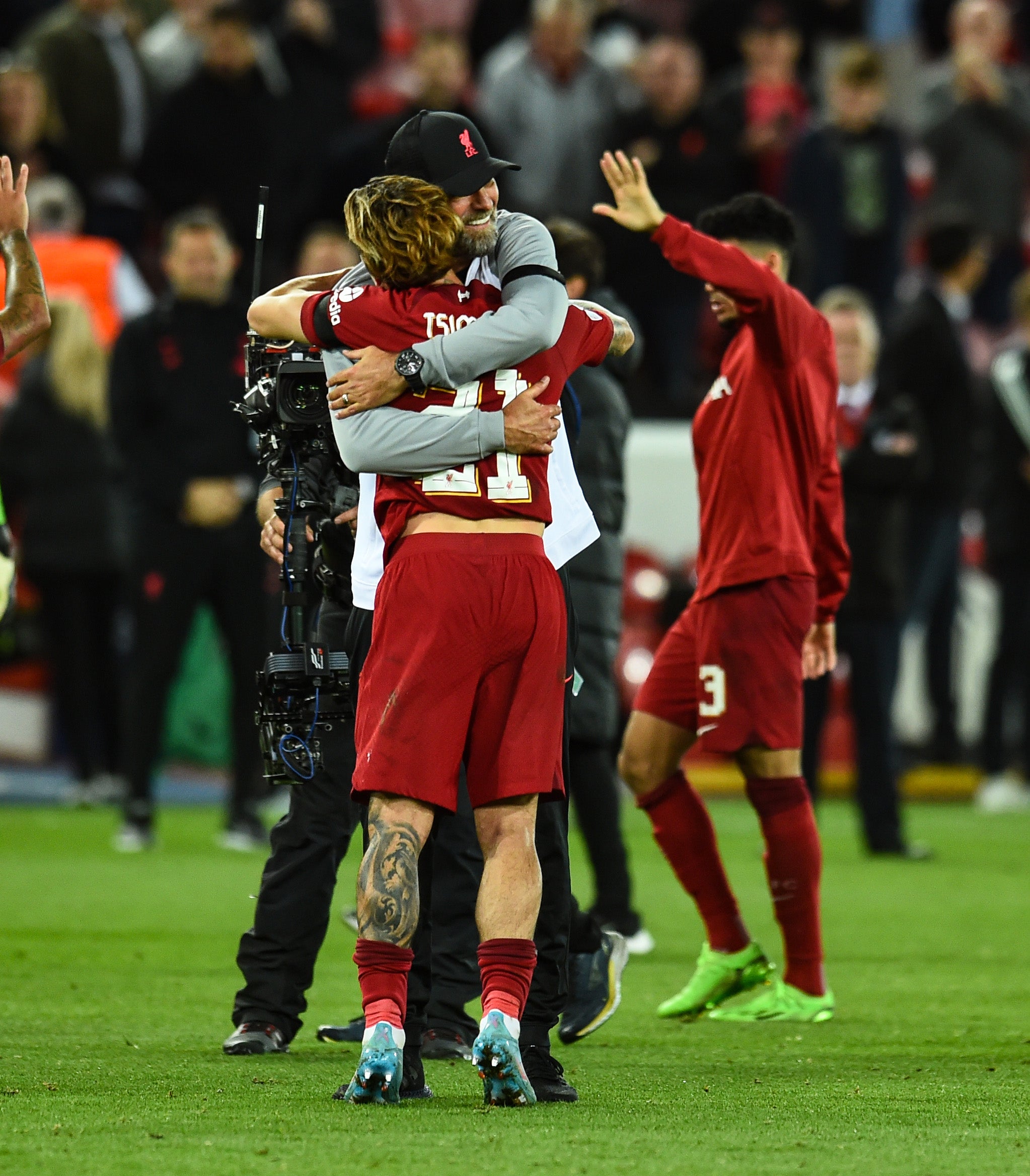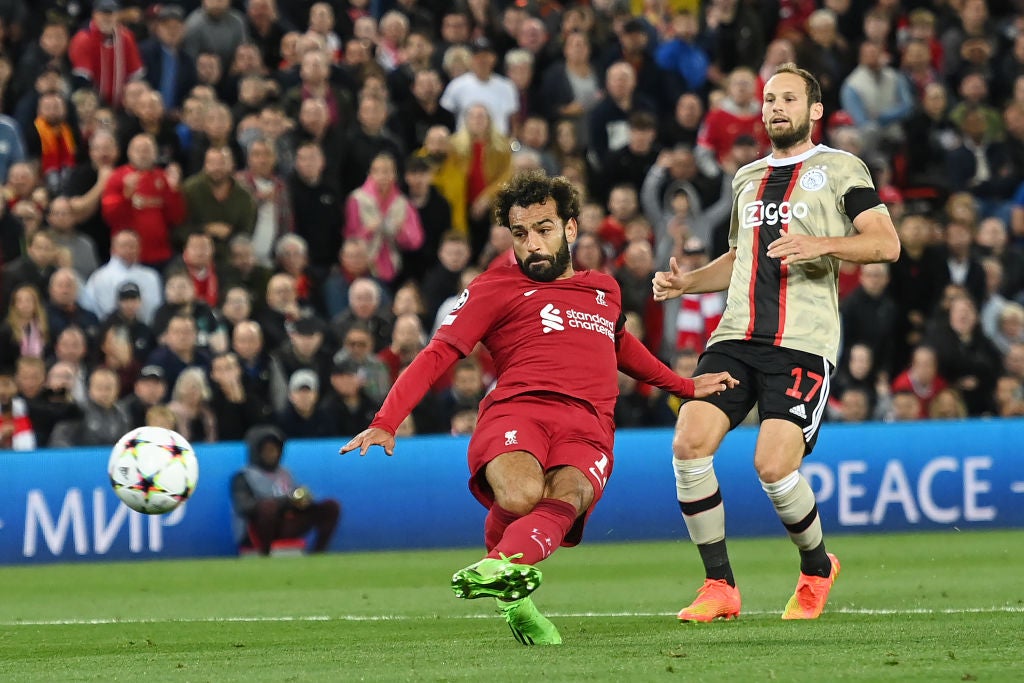
Liverpool had needed to reinvent themselves, Jurgen Klopp said, and they did. As winners, albeit just about. Klopp had greater things on his mind in the bowels of the Stadio Diego Armando Maradona than the precise choice of words in his second language, but if the definition of reinvention brought debate then the Liverpool manager’s version was less revolutionary than retro.
It was more old Liverpool than new Liverpool, more the Liverpool of the last few years than a glimpse of a very different era. All of which felt logical, given the difficulty of reinventing a side in six days with the same squad. But if Ajax were beaten by a late Joel Matip header – “nobody was surprised it was a set-piece,” said Klopp after a typical Liverpool goal – they also lost to a team with a more familiar feel. If Liverpool did not play football, as Klopp sees it, last week, they did once again.
“If you put the two games together, Napoli and tonight, you don’t recognise properly that it’s the same sport. It was all different. The start was different. The middle was different. The end was different.” That sweeping statement came within the context: “Nobody gets carried away.” Reinventing Liverpool is really rebuilding Liverpool. This, he said, was: “A first step.” A step backwards, taking them closer to previous seasons’ excellence, represented a step forwards. The performance in Naples was, felt Virgil van Dijk, “unacceptable”. The response was acceptable.
It was not Liverpool at their best, but it was them with principles restored. Klopp admitted he lost count of the times he used the word “compact” in his post-match interviews in Naples. He was lamenting what they had lost. They regained a sense of shape and structure in midfield. There is something deeply technocratic about distances between teammates, but it is part of the basis of Liverpool’s defensive game. Too often this season, midfielders going in different directions have formed giant lopsided triangles. Here they were close together, a pressing game implemented by players harrying as a pack. That cohesion allowed Liverpool to play on the front foot. In that, they were epitomised by the effervescent Kostas Tsimikas.
Their calmer attitude was summed up by their match winner. Joe Gomez was panicked in Naples but Matip is an unflustered character as well as a line-breaking dribbler from the back. If there are a host of reasons for Liverpool’s problems in their troubled start to the season, one is a simple matter of personnel: remove too many of the premier people – and after his stellar season last year, Matip felt desperately unlucky not to start the Champions League final – and the squad became stretched.
Respite came in the shape of reinforcements. The carnage in Naples concealed a rare fringe benefit, a fitness exercise for Matip and Diogo Jota in the second half as each gained valuable minutes. If Matip’s inclusion at Gomez’s expense was a predictable change, Jota’s return to the starting 11 felt more instructive. Klopp had a three-way choice, between the past and the future, the ageing talisman Roberto Firmino and the summer signing Darwin Nunez. He instead plumped for Jota.

“He combines the qualities of Bobby and Darwin,” he rationalised before kick-off. If, in itself, it contains a hint of trouble for Nunez, benched for a second successive Champions League game, deemed to be lacking too many of the qualities that rendered Firmino special, Jota showed what he meant.
His drought now spans 16 games but he buzzed around, showing a Firmino-like ability to materialise between the lines. He supplied Mohamed Salah’s first goal in eight Champions League games by darting into space to meet Luis Diaz’s header, allying speed of foot with speed of mind.
Klopp has found a variety of ways of praising Firmino over the years; at his most effusive, he has said that “people will write books” about the Brazilian. Yet his most accurate description may be one of the simplest: he once called Firmino a “connector”. While he sat on the bench, Jota connected midfield with attack, Diaz with Salah. He showed a blend of irrepressibility and positional nous.

At their best, Liverpool have been knitted together by connectors. They continue to have defensive difficulties on their right, with Alexander-Arnold’s attacking excellence offset by problems when exposed. Liverpool missed Jordan Henderson, who provided defensive ballast when the right-sided trio consisted of him, Mohamed Salah and Alexander-Arnold. Harvey Elliott’s task is to ally his talent with that solidity. Henderson’s career is a triumph of work ethic.
There was something quintessentially Kloppian in that Liverpool, who ran their way to glory, encountered adversity and found an answer in industry. They ground Ajax down, 23 shots eventually producing two goals. “When you have a problem and you want to sort it immediately, put a bigger shift in,” Klopp said. A show of character, he thought, was “the most important thing”. It was a sentiment he could have voiced at any time in the past seven years. It was not reinvention, but it was reinvigoration.







